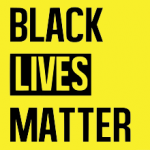By Laura Stephens-Reed
My four-year-old loves to watch videos on my phone. Anytime he hears music or voices other than my husband’s and mine, he bolts through the house to find out what kind of entertainment he’s missing out on.
I was mindful of this pattern as I took in a Facebook live stream – broadcast from the phone of the Rev. Traci Blackmon, UCC pastor/prophet – of the “Unite the Right” rally and counter-protest. Sure enough, I heard little feet approaching in short order. Levi crawled into my lap, quiet and attentive. At that point, violence had not yet erupted in Charlottesville, but even via technology there was an aura of barely-controlled chaos.
“Mommy, is God in this video?” I was caught off guard by the question. It’s not as if we regularly watch religious videos on our devices. I thought for a moment. “Yes, God is in this video, in a way. There are some people saying mean things, and there are other people who are standing up for what is right. God is using the people standing up for what is right to show God’s love.” Levi got quiet again. We heard someone in the background yell, “Nazi scum!” “Was that a mean thing, Mommy?” “Yes. They were saying it about someone who is being mean, but that doesn’t make it ok to say.” He watched for another minute or so, then moved on to a more energy-burning activity. I kept the stream on for a while, concerned for clergy friends and others who were putting their lives on the line to protest racism.
I followed the news throughout the day, but Levi and I didn’t talk again about the video. I went back and forth with myself about whether to bring it up.
One internal voice said, He’s only four years old. He hasn’t asked about it again. He’ll find out soon enough that the world is an unjust place. It hasn’t occurred to him to treat people differently based on the color of his skin.
The other internal voice said, He’s old enough to start to understand. He’ll go into a pre-K schoolroom on Monday in which half of his classmates are African-American or Hispanic. He lives in a hotbed of covert and overt white supremacy. He needs to grasp from early on that racism is a sin all Christians must work against.
The first voice, I knew, was borne of privilege. Moms of African-American four-year-olds don’t get to choose whether to address racism with their kids. It’s a matter of necessity, even survival.
The second voice was right. My son is brave. He is thoughtful. He is kind. We could start a conversation that would – must – be ongoing. Still, I confess that I didn’t feel courageous enough until I saw a Presbyterian pastor friend post on Facebook that she’d had this talk with her four-year-old. No more excuses. It was time.
I pulled Levi into my lap again on Sunday morning and reminded him about the video we had watched. I told him that the people saying mean things believe those who have skin like ours are better than people with brown or black skin.
“Are we better, Mommy?”
“No. We are not. The people who say that are wrong. God loves all of us very much, no matter what color our skin is.”
“Why do the people say that, then?”
“I don’t know, because we all matter to God.”
This answer was at best incomplete. It felt dangerously close to the “all lives matter” defense that white people use to keep from listening to people of color. And while I don’t know on an intellectual level why some people think they’re better than others, I struggle with my own internalized racism that comes from forty years of cultural messages and systemic privileges.
Levi and I talked for a few more minutes about why the people were allowed to say mean things. That we should use our words to help, not hurt. That if we hear someone saying something mean about someone’s skin color, we should speak up. That if he ever has questions about what we talked about, I would be there to respond.
It was a very halting, flawed attempt on my part to introduce my son to our roles in ending racism. As he gets older and I get more knowledgeable, I hope I’ll get better at it.
But it was a start.
Laura Stephens-Reed is regional director for CBF Peer Learning Groups in Alabama, Florida, Georgia and South Carolina. She is also a clergy coach and congregational consultant who blogs at laurastephensreed.com.
Note: The views expressed here in columns and commentaries are solely those of the authors.
Interested in writing for CBF at Patheos? Submit your column idea to CBF Communications Director Aaron Weaver at [email protected].










